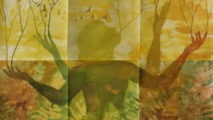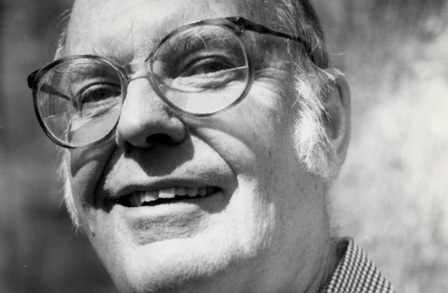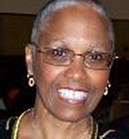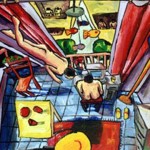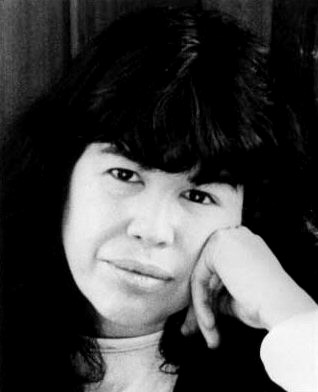When the lights went out the second time, we stepped into the hall to see if the blackout was affecting our apartment alone or the entire complex. The night manager yelled up the stairway that he had tried calling the power company, but the land lines were dead, as well as our smart phones, which were limited to emergency calls only. Standing at the balcony rail, I had the sensation of being on a sinking ship.
The teenage couple across the hall stood hand in hand outside their door, their clothes disheveled in the thin yellow flame of the candle that Mrs. Klibinsky held in her palsied, shivering hand. Mr. Lombardi had also stepped out to see who else had noticed the sudden blackness, even though he himself was blind and wore dark glasses. The teenage couple—we didn’t know their names—had only moved in the previous week. The young woman had asked Lori for money outside on the curb before she had recognized her as a neighbor. Her buttons mismatched their buttonholes. Her shirt was only half snuggled into her pants—a French tuck. Her feet were bare. Her half-crescent smile seemed the leftover sign of lovemaking.
Mrs. Klibinsky allowed wax to dribble from the tilted candle onto the hardwood floor of the hall. She placed the butt of the candle into the puddle of wax, letting it cool before taking away her hand. She was the first to sit down. Strange for a woman her age, she sat cross-legged, Indian style, hands at her side with opened palms, as though preparing to lead a séance. Lori followed her lead, and then the rest of us sat around the candle in a loose circle, Mr. Lombardi feeling his way into a vacant space as though by sixth sense.
“Well,” Mrs. Klibinsky said, casually, comfortably, “here we all are.”
“Yes,” Lori echoed, “here we are, all right.”
We had only moved in together the month before—a new apartment, fresh living quarters, a symbol of hopefulness for a shared life on equal terms. A month later, we were still navigating the awkwardness of close encounters in such a small space as the studio provided. The “his” and “hers” towels were her idea, meant as a joke. In reality, we were still jockeying for territorial rights in the medicine cabinet, the closet, the mirror when brushing our teeth.
The teenage couple looked at each other and giggled.
“I could get my trombone,” Mr. Lombardi suggested.
“That won’t be necessary,” Mrs. Klibinsky demurred. We had all been victims of Mr. Lombardi’s trombone practices workday evenings and weekend afternoons, during which the notes vibrated with an agile nervousness, sliding in improvisation to the accompaniment of a low-volume jazz recording on Mr. Lombardi’s turntable.
One of the teenagers—the young man—lit up a joint and passed it to his girlfriend, back and forth. They seemed lost in a universe of their own design. Lori nudged my arm, and I looked at her and smiled. Her face looked tragic and serene in the flickering flame. I held her hand. A moth, awakened out of some cobwebbed corner, wrapped itself in violent orbits about the candle.
Outside, we could hear the lootings begin: the crashing of storefront windows, the shouts of encouragement, the sirens. A couple of gunshots popped distantly like firecrackers. Rubber bullets, we hoped. Screams of terror followed, either feigned or real.
Curious about the noise, the teenage couple padded down the hall toward the window at the landing. They stepped lightly, like innocent cats, and, done with their joint, stood hand in hand, staring out the window, like balcony patrons of a scripted performance, a poor man’s opera.
“The candle will not last much longer,” Mrs. Klibinsky said, sadly, tenderly, her voice full of a blue-edged regret.
We stared at the flame, at the wax overflowing onto the floor. Our eyes followed the course of the moth, still frantically searching for a point of entry. Mr. Lombardi stood up and walked to his room, after bowing to each of us in turn, then bidding us all a good night.
Mrs. Klibinsky also asked to be excused. “I have my first student tomorrow at eight o’clock sharp.” Mrs. Klibinsky taught voice to preschoolers—future wannabes on The Voice. “I will leave you the candle,” she said, by way of parting.
Lori and I stared at the candle as though it were the dying symbol of a civilization.
From Mr. Lombardi’s room, the trombone lifted its dark, somber voice. Lori put her hand on mine, giving my fingers a squeeze.
“Let’s go back,” she suggested.
“No, let’s sit here awhile.”
It felt extravagant—so much space to ourselves.
B. Robert Conklin’s credits include stories published in Blue Moon Literary & Art Review, THAT Literary Magazine, and The Fictional Café. A graduate of Ohio State with a teaching background in drama, he enjoys the unpredictable moments of family life with his spouse, three kids, four cats, and two ferrets.
Related Posts
« PAY UP OR ELSE – Miriam Edleson BICYCLES – Melissa Rosato »

